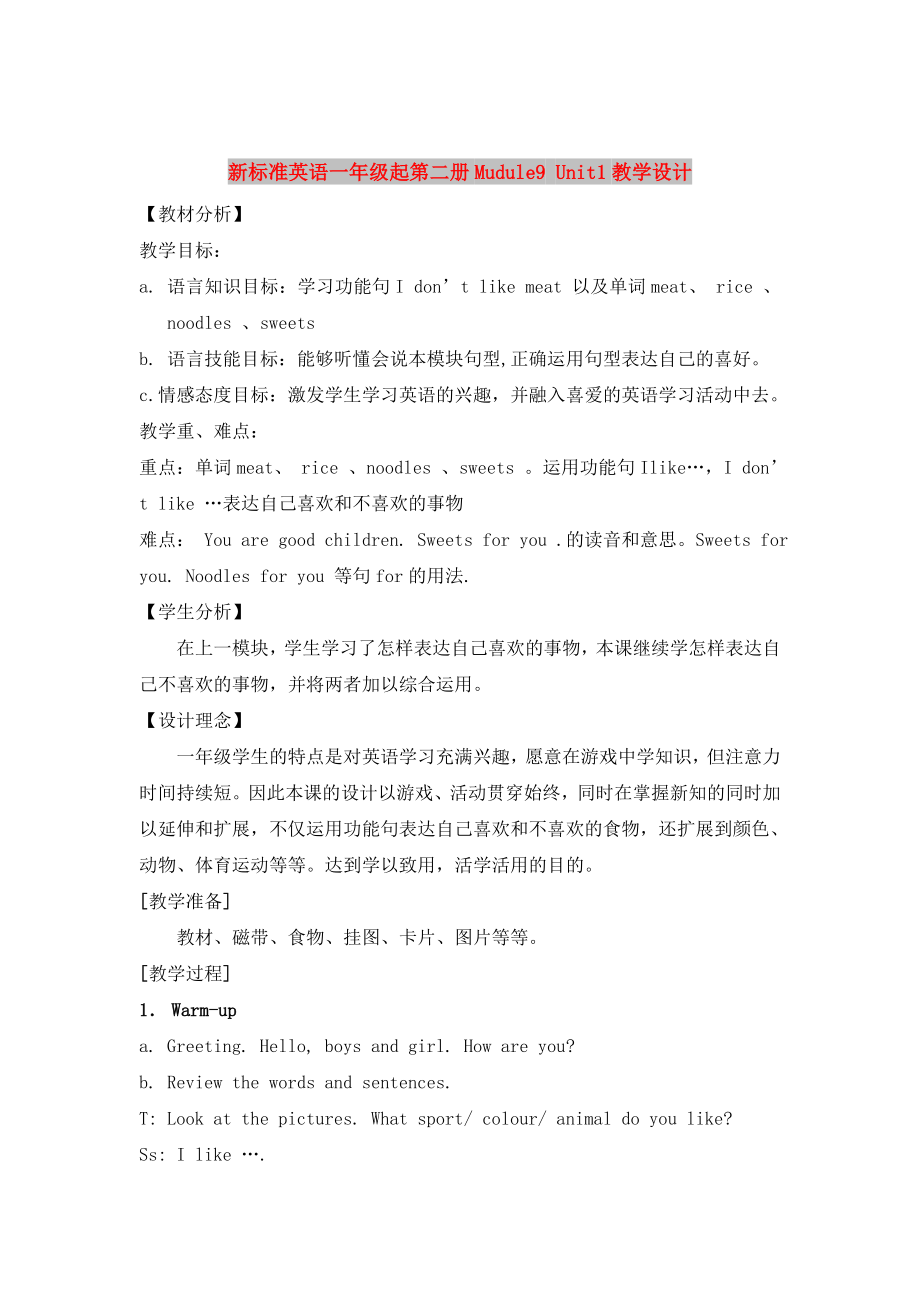《新標(biāo)準(zhǔn)英語一年級(jí)起第二冊(cè)Mudule9 Unit1教學(xué)設(shè)計(jì)》由會(huì)員分享��,可在線閱讀���,更多相關(guān)《新標(biāo)準(zhǔn)英語一年級(jí)起第二冊(cè)Mudule9 Unit1教學(xué)設(shè)計(jì)(4頁珍藏版)》請(qǐng)?jiān)谘b配圖網(wǎng)上搜索����。
1����、
新標(biāo)準(zhǔn)英語一年級(jí)起第二冊(cè)Mudule9 Unit1教學(xué)設(shè)計(jì)
【教材分析】
教學(xué)目標(biāo):
a. 語言知識(shí)目標(biāo):學(xué)習(xí)功能句I don’t like meat 以及單詞meat、 rice 、noodles ����、sweets
b. 語言技能目標(biāo):能夠聽懂會(huì)說本模塊句型,正確運(yùn)用句型表達(dá)自己的喜好。
c.情感態(tài)度目標(biāo):激發(fā)學(xué)生學(xué)習(xí)英語的興趣����,并融入喜愛的英語學(xué)習(xí)活動(dòng)中去。
教學(xué)重�����、難點(diǎn):
重點(diǎn):單詞meat����、 rice 、noodles ���、sweets �����。運(yùn)用功能句Ilike…����,I don’t like …表達(dá)自己喜歡和不喜歡的事物
難點(diǎn): You are good children.
2、 Sweets for you .的讀音和意思���。Sweets for you. Noodles for you 等句for的用法.
【學(xué)生分析】
在上一模塊��,學(xué)生學(xué)習(xí)了怎樣表達(dá)自己喜歡的事物��,本課繼續(xù)學(xué)怎樣表達(dá)自己不喜歡的事物,并將兩者加以綜合運(yùn)用����。
【設(shè)計(jì)理念】
一年級(jí)學(xué)生的特點(diǎn)是對(duì)英語學(xué)習(xí)充滿興趣,愿意在游戲中學(xué)知識(shí)�����,但注意力時(shí)間持續(xù)短�����。因此本課的設(shè)計(jì)以游戲����、活動(dòng)貫穿始終,同時(shí)在掌握新知的同時(shí)加以延伸和擴(kuò)展����,不僅運(yùn)用功能句表達(dá)自己喜歡和不喜歡的食物��,還擴(kuò)展到顏色�����、動(dòng)物����、體育運(yùn)動(dòng)等等�����。達(dá)到學(xué)以致用�����,活學(xué)活用的目的�����。
[教學(xué)準(zhǔn)備]
教材����、磁帶���、食物、掛圖�����、卡片����、圖片等等。
[教學(xué)
3����、過程]
1. Warm-up
a. Greeting. Hello, boys and girl. How are you?
b. Review the words and sentences.
T: Look at the pictures. What sport/ colour/ animal do you like?
Ss: I like ….
2. Presentation
a. Teach the new words.
Oh, I’m hungry. (揉肚子) I want to eat. (吮吸面條的聲音). Guess what’s this?
Yes.
4����、 “Noodles” Teach it. T: I like noodles. What about you? Ss: I like noodles.(板書)
c. I’m still hungry. I still want to eat. Look. I like it. What’s this? Rice. (不發(fā)音,讓學(xué)生注意口型)
Chick����,chick, chick, I like rice.
Tweet,tweet, tweet, I like rice.
d. -是什么味道這么香?I will have a look.( Show a picture). Oh, wh
5���、at’s this? Do you like it? How to say the word, can you guess? (讓學(xué)生自己猜測(cè)讀音���,培養(yǎng)學(xué)生的觀察能力)����。(meat)
Oh, I’m a lion. I like meat. What about you? (模仿獅子)
e. I think noodles,meat, rice are very very nice.(拍手)
Say the chant. Noodles, meat, rice are very very nice.
Mmm, mmm, mmm! Very,very, nice. (You a
6��、re good children.)
e. Practise to say “I like noodles/meat/ rice.”
3. New-teaching
a. Oh, it’s 12 o’clock. It’s lunch time. Our friends are eating. Q1: What are they eating? Let’s listen.
Ss: noodles, rice, meat and sweets. Teach the new word “sweets”.
Show some pictures: So many _______. T
7���、hey are ________.
T: Do you like sweets? Ss: Yes.
T: Does Tom like sweets too? What does Tom like? What doesn’t Tom like?
b. Listen to the tape and try to repeat, find the answer.
c. Find the answers. I like sweets. I don’t like noodles/ meat/ rice.( You are a good boy/ girl. Stickers for you) (
8���、回答出問題的,獎(jiǎng)勵(lì)學(xué)生)
d. Read the sentences. Play a game.
e. Open the books. Read after the teacher.
4. Consolidation
a. Look. 5years later, there’s a zoo in Changhai. I will choose some animals for the zoo. Can you help me?
I like …. I don’t like …
The zoo will be great.
c. Look. A happy face/ a s
9���、ad face.
T: Football.Ss: I like/ Idon’t like football.
c. Draw a picture. Do you like colouring?
5. Summary and Homework:
a. Let’s look what we have learnt?
b. Remember the words and the sentences, then teach you mum and dad.
6. Blackboard
Module 9 Unit 1
I like meat.
I don’t like noodle
10����、s.
rice.
meat.
附送:
2019-2020年新標(biāo)準(zhǔn)英語一年級(jí)起第四冊(cè)Mudule9 Unit1教學(xué)設(shè)計(jì)
Teaching aims
1. Knowledge objects
(1) To enable the children understand and remember the new words: turn left, turn right, go straight on , West lake Road , East lake Road , Excuse me.
(2) Grasp the drills: Turn left!
11��、 Turn right! Go straight on! And use them in real situations.
2. Ability objects
To develop the children abilities of listening and speaking. To train their ability of observation.
3 Moral objects; To make the children be careful and helpful.
Teaching Key and Difficult point
(1)
12����、Key points: (1) Words and drills
(2) use the target drills in real situations.
(2)Difficult point: Use the target drills properly in different situations.
Teaching aids: cards , PPT, map
Teaching steps
Step1.Warm-up
1.Listen and do actions
Step 2 Presentation
1. Now Let
13、’s listen and do “Turn around”, Then learn new word”right left”, (板書 ���,教讀)
2. learn target sentences ”Turn left! Turn right! Go straight on!”
3. T: You are very clever, Today we’re going to use”turn left ,turn right, go straight on” how to ask and tell the way. Now let’s learn moduule9 unit1 Turn
14��、left!
Step 3 Text-teaching
1. Show a map : Sam is going to Daming’s flat, But he can’t find the way ,Listen to the text then answer: Where does Daming live?
2. Then learn “East Lake Road ,West Lake Road”
3. Listen again ,Then circle”go straight on , turn right, turn left”(為學(xué)生能回答出 Where’s west l
15���、ake Road?做鋪墊)
4. T:Now ���, I’m Sam, Excuse me , Where is West Lake Road?(在真實(shí)的語境中學(xué)習(xí)Excuse me)
S: Go straight on , then turn left, then turn right.
5. Look at the map,Sam is in West Lake Road, but Daming Lives in East Lake Road.So Sam said I’m lost!(讓學(xué)生明白lost的意思)
6. T:Now Sam is lost, Let’s help him
16、. Excuse me. Where is East lake Road?
7. Listen and repeat
Step 4 Task-fulfilling
1. Do Activity books exercise2
2. Listen and move on the map ,Now where are you?( 給學(xué)生每個(gè)人發(fā)一個(gè)棋子���,先聽老師口令��,看看我們到達(dá)了什么位置)
3. Practice this game in groups.
Step 5 Summary and Homework
Summary: What have you learnt today?
Homework:Copy the words and practice the drills
Listen and read the dialogue.
板書設(shè)計(jì)
Module9 unit1
Turn left!
Turn right!
Go straight on!
 新標(biāo)準(zhǔn)英語一年級(jí)起第二冊(cè)Mudule9 Unit1教學(xué)設(shè)計(jì)
新標(biāo)準(zhǔn)英語一年級(jí)起第二冊(cè)Mudule9 Unit1教學(xué)設(shè)計(jì)

